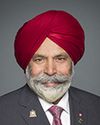Mr. Chair, I could elaborate on some of that in terms of the countries with strategies. The G8 summit on dementia was convened in 2013. Before that, there were only 13 countries in the world that had effective and meaningful strategies, which means policy and funding as well. After that conference, the number grew quite rapidly, and we're now approaching 30. Canada, with its strategy, would make either number 29 or number 30 on that list.
In terms of Canada being behind, I can only speak from the perspective of many of the researchers I've talked to around the world in my years with ADI. As far as research is concerned, Canadian researchers are renowned in the world. They are some of the leaders in neurological study and research and share that with the rest of the world. What has kept us behind is the fact that we do not have a strategy. It happens often that when I attend board meetings in some part of the world, I'm always asked when the strategy is going to come. It was with great pleasure that I was able to say, well, very soon. After that, hopefully, meaningful funding, as mentioned in the Senate report, will make it a workable reality.






